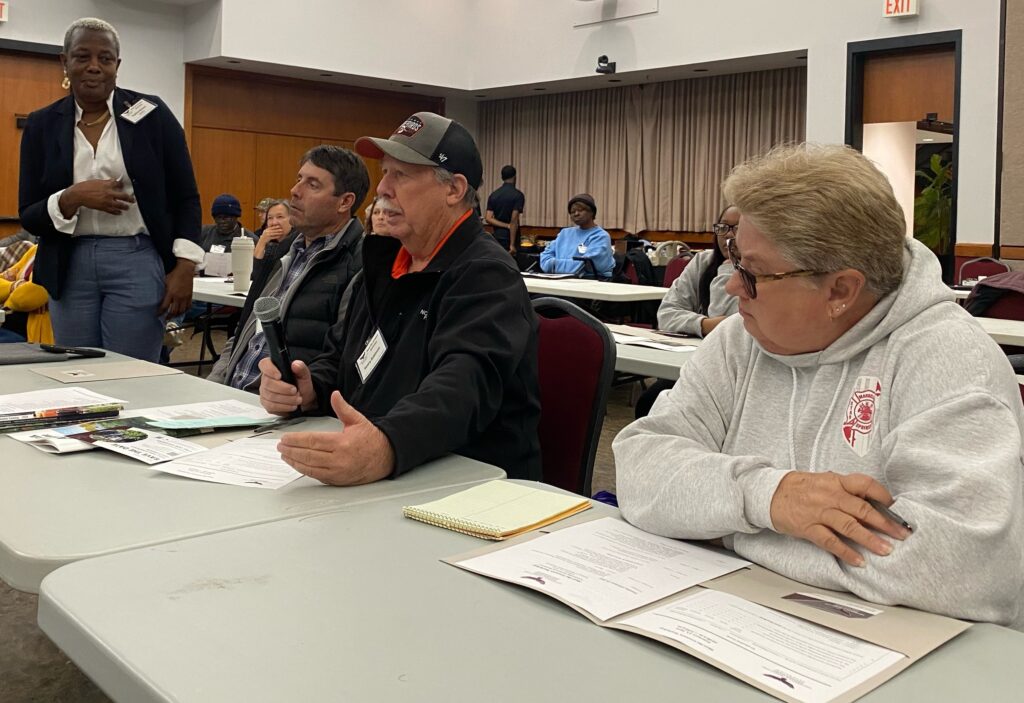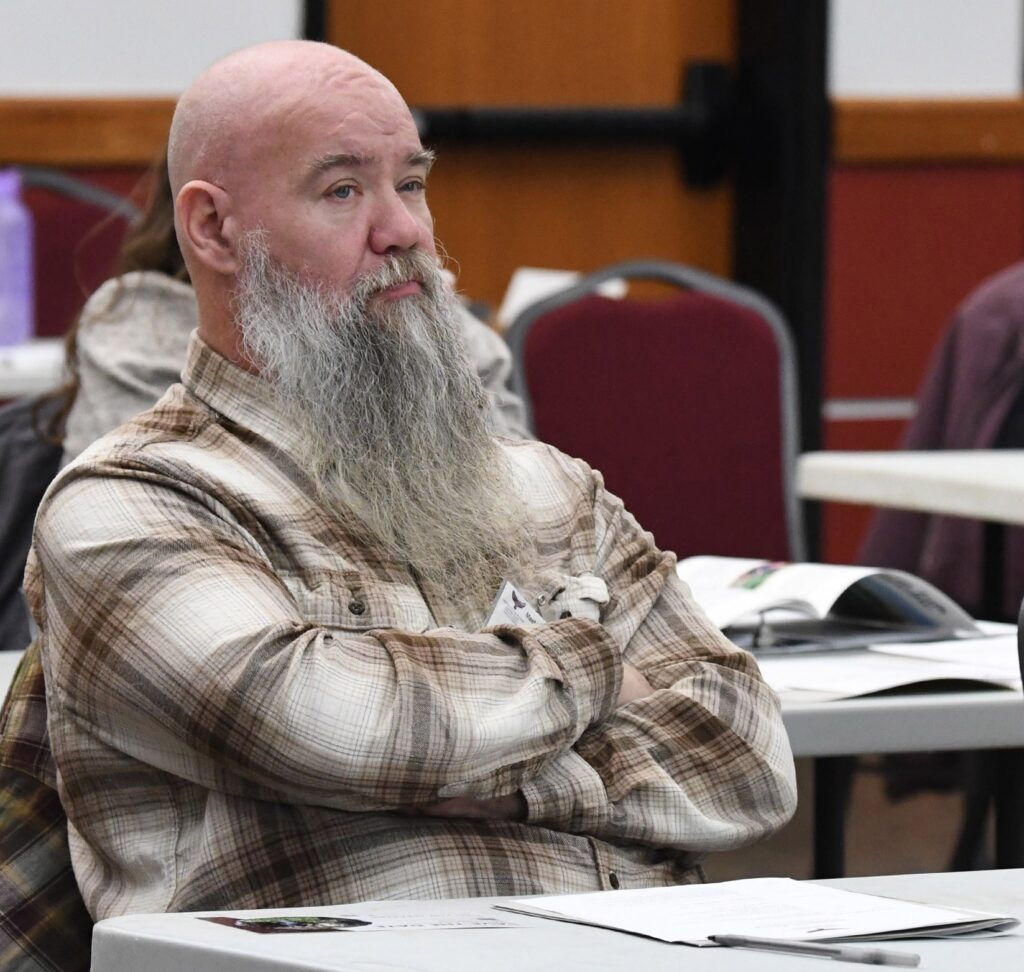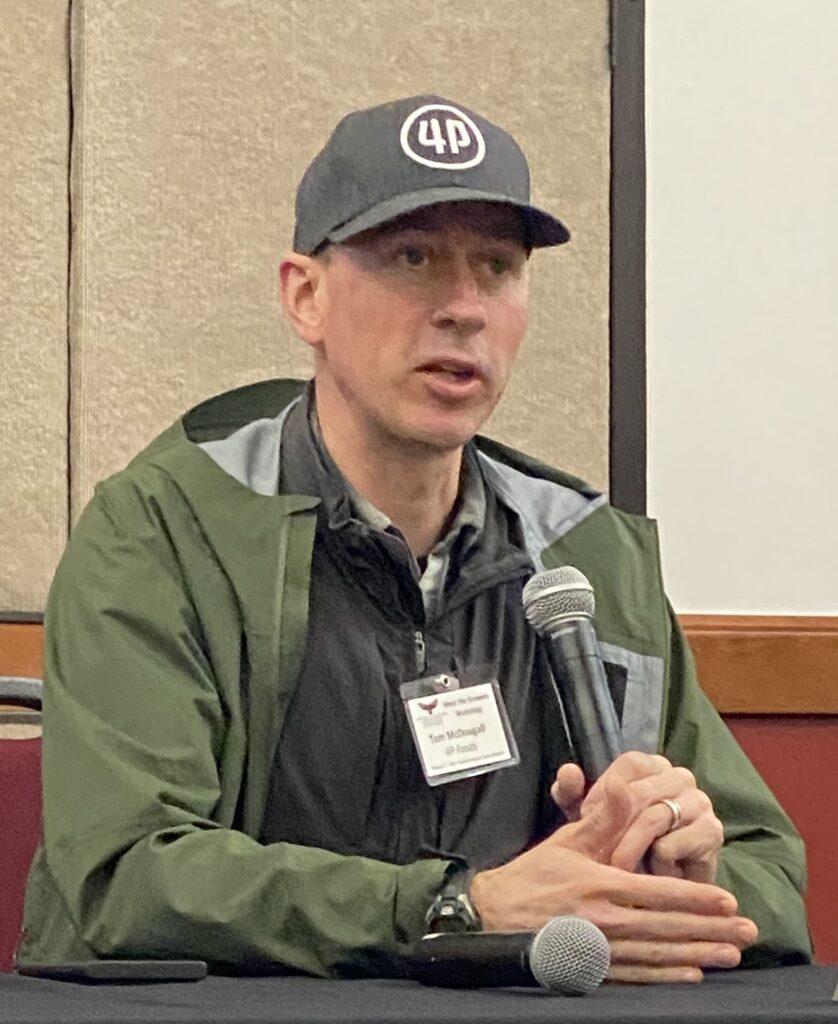
A full-day Meet the Growers workshop Feb. 13 served as a one-stop shop connecting specialty crop growers to buyers and financial assistance programs. Nearly 40 participants took advantage of the opportunity aimed at increasing farm profitability.
“Getting farmers in one place with available resources to learn all that is available is what today is about,” said Dr. Nadine Burton, (at right, standing) an alternative crop specialist with UMES Extension and event organizer. “We have to make sure that farms are sustainable. Many small farmers have to do more than just farm to be viable.”
It was John Roduik’s (below) first workshop, but not first encounter with UMES Extension outreach and education. The small farmer from Marion Station has been connected to a beginning farmer class and is part of a specialty crop research project through Burton’s work.

“Last year was my first year farming. UMES played a huge role in the success I experienced,” Roduik said. “Dr. Burton and Mike (one of the farmers working with her) came to my farm at least 10 times to show me how to set up placement of crops, harvesting techniques and equipment needed like weed cloth and irrigation. I couldn’t have done it without them.”
“Today’s workshop provides a great opportunity to meet the people we’re selling to and to know where the food is going,” he added.
Small farmers had access to major buyers such as the Maryland Food Bank, 4P Foods, Aramark, The Common Market, Dreaming Out Loud and the Capital Area Food Bank.
“I appreciate an event like this because it’s bringing growers to us more efficiently than us going out to visit individual farms,” said Amy Cawley, coordinator of the Maryland Food Bank’s Farm to Food Bank Program. “It put their faces in front of us.”
Kate Long, Maryland Food Bank’s director of nutrition, added: “The demand for food is huge, particularly healthy food. We’ve received feedback from food pantries that this programming has been impactful to communities. There has also been an increased focus recently on making a strategic plan for how to serve culturally inclusive produce to our neighbors in need.”
State agencies in Maryland are mandated to buy 20% of their produce from local growers.

“Local farms are willing and able to step up for the demand,” said 4P Foods CEO Tom McDougall, (at left) whose business model is the delivery of fresh, high-quality food from small and mid-sized family farmers and artisans, prioritizing local and regional partners in and around the D.C. metro area. “It becomes a policy decision for people in positions of power to influence procurement law and strategy, and the ability to move the needle forward.”
“There is justification behind the decisions policy-makers make like environmental, social and health reasons,” said a Somerset County attendee. “It’s a full circle kind of thing — long-term resiliency and food security. Government can be segmented and only work within their areas.”
Representatives of the Maryland Department of Agriculture, Natural Resources Conservation Service, Natural Conservancy, Chesapeake Agriculture Innovation Center and the USDA’s Value-Added Producer Grant program were on hand to impart information on grant opportunities and other assistance programs.
The U.S. Economic Development Administration’s F³ Tech Accelerator Program and Good Earth Therapy presented helpful online marketing technology for special crop growers and the Around the Bay Farmers’ Alliance shared practical knowledge and their experiences.
Burton’s next event is a Plant Your Own Specialty Crop workshop Saturday, March 16, from 9 a.m. to noon at the UMES Research, Extension and Teaching Farm on Stewart Neck Road in Princess Anne.
Farmers can receive instruction on different methods for planting seeds from specialty crops for transplants and the requirements for optimal growth. The $20 event fee covers planting materials including seeds, trays, potting soil and labels along with a place to grow up to 20 trays.
For more information or to register visit www.umes.edu/extension/events.
This educational activity is part of the Improving Farmers Access to Resources and Management Solutions II (IFARMS2) initiatives.
Gail Stephens, agricultural communications, University of Maryland Eastern Shore, School of Agricultural and Natural Sciences, UMES Extension, gcstephens@umes.edu, 410-621-3850.
Photos by Todd Dudek and Kara Nuzback, Ag Communications, University of Maryland Eastern Shore, School of Agricultural and Natural Sciences, UMES Extension, tdudek@umes.edu kanuzback@umes.edu.

